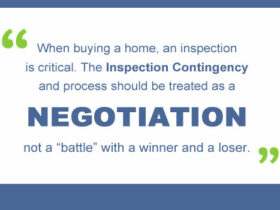In a real estate contract, the financing contingency is a provision that allows the buyer to terminate the contract if they fail to obtain mortgage approval and funding for the purchase price within a specified time.
Not all home financing contingencies are created equal, however. Depending on the region and local real estate customs, such contingencies can vary greatly, particularly when non-MLS forms or addenda are used, or other local or state promulgated forms are not used, for example, when an attorney creates the contract, or when a home builder’s purchase and sale contract is utilized instead. Some contracts even stipulate the financing rate.
It’s important to understand the financing contingency before submitting any offers to purchase property. There are several reasons you should be aware of this important real estate contract clause before making any commitment. What may happen if deadlines pass or loan applications aren’t accepted.
How Does a Home Loan Contingency Work?
Also known as a mortgage contingency clause, the financing contingency is designed to protect the seller and the buyer in a real estate transaction.
With a financing clause in the sale agreement, sellers are protected if the buyer can’t get a home loan within a stated time frame; the contract is voided. This protects the seller by allowing them to back out of the home purchase agreement and make a new deal with a different buyer.
As the buyer, you are protected if you don’t close on your house by a certain date because otherwise, you could be in breach of contract and may lose your deposits and earnest money deposit made toward the purchase price. If, as a buyer, you cannot get final approval on the loan by the stated deadline, then you most likely may be able to back out of the purchase and receive your earnest money payment back.
However, keep in mind that this type of contingency works differently by region and depending on what’s written in the contract. Some purchase and sale agreements contain more seller-friendly clauses, while others lean towards protecting the buyer more. This is why it’s important to have an experienced real estate agent working to help guide you through the transaction.
How Long is a Home Financing Contingency?
The length of a mortgage contingency depends on how long it takes to close on a home loan, and local real estate market customs may also influence it. For example, it’s not uncommon for the mortgage contingency to last through closing in some locations, while in others, real estate agents may recommend a customary term such as 14 days.
It will likely take some time for lenders to get back to you after they’ve reviewed your application. For instance, it can take longer for an application to get approved if there’s a holiday during which people aren’t working. Delays are common, and a longer contingency period can help protect against the seller forcing you to walk away from the contracts. Furthermore, you may find that even though you obtained a pre-approval letter, your mortgage application ends up being denied. If this happens, you would still have time to arrange for alternative financing before the contingency expires.
Can a loan contingency be extended? The short answer is usually “yes,” except the seller must agree in advance. The answer depends on the conditions that were agreed to in the contract.
Remember that all real estate clauses are negotiable. It’s important to understand what happens during this time period because you could be at financial risk if you do not abide by the contract terms. If you think you will need more flexibility in obtaining financing, try to negotiate a longer time period.
Types of Financing Contingencies – Active vs. Passive
Passive Contingency
The passive contingency is the most common and puts the primary burden upon the buyer.
This states that the home BUYER has a specified number of days to apply for and secure a firm loan commitment from a bank or other type of lender – one that has been fully underwritten. (This is NOT a pre-approval – rather, this is when the loan underwriting process has taken place.)
If the BUYER surpasses the financing deadline without terminating the contract or requesting an extension (which the seller must agree to in writing), then the BUYER has automatically waived the contingency, meaning the buyer has committed to producing all the funds required to purchase the home, whether the loan is ultimately approved or not. In this case, as a buyer, you would need to pay close attention to the calendar and make sure you are counting the days properly.
Active Contingency
The active contingency is the second most common type of financing contingency that is a bit more complicated and puts more of the burden upon the home seller.
In this scenario, the financing contingency addendum states that the SELLER has the right to terminate, but only after an agreed-upon number of days passes and only after serving notice to the buyer that the seller “may” choose to terminate the contract at any time after delivery of such notice.
If the SELLER does not serve this notice after the specified number of days in the contingency, the financing contingency survives through the remainder of the sale process. Think of this potential notice like the SELLER is waving their arms and asking, “Hey… what’s up with your financing?”
If the home buyer has arranged to finance and it has been fully underwritten, then the buyer may choose to satisfy the financing contingency at that time fully. If, however, the buyer does nothing after receiving this notice, then they are at risk of the home seller terminating the contract at any time.
Since most loans are not fully underwritten until just before closing, most buyers will not volunteer to waive the financing contingency because if the financing fails, they will likely be subject to the forfeiture of earnest money. Proceed carefully should this scenario happen to you.
How & When to Use Financing Contingencies
Understanding the nuances of financing contingencies is crucial when navigating the complexities of real estate transactions. The following table illustrates various uses of financing contingencies and the pros and cons of each. This knowledge can empower buyers and sellers to make informed decisions, ensuring their interests are safeguarded throughout the transaction process.
| Use Case | Pros | Cons |
|---|---|---|
| To secure a mortgage |
|
|
| To obtain a better interest rate |
|
|
| To allow time for selling a current property |
|
|
| To assess property appraisal |
|
|
| To evaluate additional financing options |
|
|
| For investment purposes |
|
|
Why Would You Not Have a Financing Contingency?
There are a few reasons why a buyer may choose not to have a financing contingency.
If you have no intention of getting financing within a certain timeframe, it may not be necessary to include a financing contingency in your offer. For example, if you want to pay for the total sale price of your new home with cash, you do not need a financing contingency because nothing stops you from buying the property outright. However, if you plan to use a traditional mortgage to finance the purchase, including a financing contingency in your contract is a good idea.
Another reason to waive the financing contingency will be if you’re in a competitive real estate market bidding against other prospective homeowners.
In a competitive marketplace where multiple offers are expected, sellers will choose offers with the highest dollar amounts, strongest financing terms, and fewest conditions and stipulations. To make their offer more competitive, some buyers may wish to submit a non-contingent offer by waiving their rights to all types of contingencies, including the appraisal contingency and inspection contingency. Doing so would obviously put you under some level of financial risk, and you will likely forfeit any earnest money if it has already been paid to the seller.
Consult With Your Agent and Lender
Regardless of the type of Purchase & Sale Contract and financing contingency, and no matter if a bank, mortgage broker, or another type of private lending is used, it is critical that both buyers and sellers understand all terms of the contract, as there are legal ramifications if either buyer or seller doesn’t perform their obligations.
Before committing to purchase a home, read the contract in full, ask your real estate agent to explain the terms, and keep your loan officer informed. By law, in most states, real estate agents are forbidden from providing legal advice. However, they should be able to explain what the contract terms mean. More importantly, while the agent’s job is to keep a close eye on the contract timeline, two-way communication is key.
Therefore, if you are a home buyer and grow concerned about your home loan financing contingency, be sure to communicate with your agent and lender.





